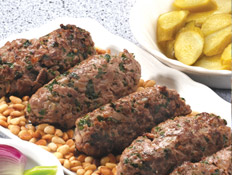Hebrew word: cuckoo (קוקו)
Sounds like:
Actually means:
"Cuckoo" in Hebrew means ponytail. Does anyone have any idea why? Maybe ponytails swing off your head like the weight in a cuckoo clock?
Hebrew word: mommy (מאמי)
Sounds like:

Actually means:
This is Miri Mesika's absolutely gorgeous song, "Mami," and no, she isn't singing to her mother. In Hebrew, "mami" actually means "sweetie," and it's a term of endearment you might use for a friend as well as a lover. Another term of endearment is "boobie," but I didn't want to post a picture of what that sounds like.
Hebrew word: bagel (בייגלה)
Sounds like:

Actually means:

Bizarrely enough, bagels are pretty hard to find in Israel. When someone asks you if you want a "bageleh," they're usually not offering a little bagel-- they're offering a pretzel.
Hebrew word: nylon (ניילון)
Sounds like:

Actually means:

Who knows why, but a plastic bag (particularly the kind that you can get at the grocery store) is called a "nylon" here. (Sometimes you hear "sakit nylon," nylon bag.)
Hebrew term: kabob (קבב)
Sounds like:

Actually means:

When I was first offered a "kabab" in Israel, I expected a shish kabob-- in other words, chunks of meat and veggies roasted in a stick. Instead, "kabab" in Israel (and it most of the Middle East, I suspect) means ground meat and spices shaped into a kind of sausage. Traditionally, they're shaped around a stick, but not always. If you actually want a shish kabob, ask for a shishlik (שישליק).
Hebrew term: salat mayonnaise (סלט מיונז)
Sounds like:

Actually means:

Actually, potato salad basically is mayonnaise salad, so maybe that one is not misleading after all. Israelis just have a more honest take on the salad's primary ingredient.
Hebrew word: Mafia (מאפיה)
Sounds like:

Actually means:
(That isn't an Israeli bakery. If it were, some of those pastries would be mushroom-filled.) Technically, the Hebrew word for bakery is pronounced ma-a-fi-a, and it comes from the verb "leefot," which means "to bake." I was relieved to discover this after being told to go down the street to buy bread from the mafia. On the other hand, if someone tells you to buy your challah from one of the mishpachot pesha... you're probably in Netanya.
I can think of a few more. French fries are "chips" (although that should come as no surprise to anyone who has traveled outside the US), the secular New Year's Eve is "Sylvester," etc. To me, "arse" (the term for a slicked-up, dressed-to-the-nines in too-tight and overly-trendy-clothing young-mizrachi-guy) always sounds like the British word for, er, hindquarters. This blog post offers a great list of some more Hebrew faux-amis.
What are your favorites? Have you ever been confused by a sound-alike Hebrew term?






Fun post (and educational - I don't know a word of Hebrew)! Thanks.
ReplyDeleteI'm laughing about these all the time. Thank you for finally clearing up "Mommy"!
ReplyDeleteI always hear "sympati" and assume it means "sympathetic" - but I think it means kind/nice.(?)
Same goes for "combina" and "protectsia" - which I assumed were similar to the english for "combination" and "protection," but it's a bit more complicated than that!
At least we have "banana" and "telephon" to make us feel like we're on top of things!
Natalie, I think sympati as "kind/nice" must have come in via Spanish or Ladino, because sympatico has the same meaning in Spanish. Fantastic post Maya. I love the Bakery / Mafia link.
ReplyDeleteGreat post! I love the visuals.
ReplyDeleteI was wondering to myself where the word "capuchon"(hoodie) came from. Turns out that it's from the Italian word Cappuccio (headgear). But it sort of makes sense when you think of the outcome of seeing the word hoodie in a sentence ("I'm going to wear a הודי today" sounds pretty racist, doesn't it?)
Mafia has the same meaning in Hebrew as long as you don't drag out the "ah". By the way, if you go to the ma-afia, be sure to ask for lechem (bread), not rechem (uterus) :P
sounds a little like my latest post....cool
ReplyDeleteThis was great! Yes when I studied modern Hebrew for a year about 35 years ago (at a university in California) one thing I noticed right away was the pronouns: "me" is who; "who" is he; "he" is she; and also thought it humorous that "dog" means fish, and "rock" means soft.
ReplyDeleteCan't remember all these years later if there were others....I'm surprised I even remember those above!
I visit here often and enjoy your blog so much.
Pony is another one, and means (hair) bangs. And parents with kids in school know that a "nylone" is also a protective plastic page pocket. I need to buy stock in those.
ReplyDeletealso, in Europe Kebab means Schwarma. that took some getting used to for me!
ReplyDeleteHannah
In ulpan my teacher had someone draw a "kapuchin" (hoodie) and I exclaimed "Oh!" because it looked like something a monk would wear. Duh.
ReplyDeleteI'm actually learning some new ones from these comments! So bangs are called "pony" and ponytails are called "cuckoo"? Go figure!
ReplyDeleteI've thought of a few more since posting this, so I think this will have to be a recurring feature. Maybe every Thurs/Fri I'll post something Hebrew language related?
When I was in elementary school, the ditty going around was, "Mi is who
ReplyDeleteand Who is He
and He is She
and DOG is a fish,
and DOIDI is my uncle!
Great post!
How about "plaster" (band-aid)?
ReplyDeleteOoh, ooh! I just thought of one now, coming out of the bathroom, and it certainly qualifies for extremely different meanings... Niagara!
ReplyDeleteMy wife was once in Bulgaria for work when the following happened. She was eating with a Bulgarian colleague in a restaurant when a group of people walked in. Something was a little weird about them, and my wife's colleague who knew Hebrew said to her that they are "bakery," i.e. they are Mafia people.
ReplyDeleteGreat blog.
This is an excellent and fascinating post. Everyone who has spent some time in Israel will love this! It is *really* confusing to English speakers when words they *think* they know mean different things! Kol hakavod!
ReplyDelete"Ars" actually comes from Arabic. It's literal meaning is "pimp". More fitting when you think about to whom it refers.
ReplyDeleteHow about 'severe' in Hebrew means reasonable
ReplyDeleteAlso 'kaved' is liver and heavy and 'hodoo' is India the country and Turkey the meat
ha! great post. im wandering through your blog.. so nice
ReplyDeleteI've lived here for 25 years and speak Hebrew fluently, but just this week I got tripped up on the meaning of a Hebrew\english word- mentali, which I had assumed meant cognitively, but actually means culturally,from mentaliut.
ReplyDeleteI enjoyed reading this post!
I have a question---what is the hebrew translation of the word that sounds like "mean" in english.
ReplyDeleteMy favorite: goomie - anything that has elasticity from a rubber band to a 'scrunchy' that holds your cuckoo together.
ReplyDelete"Protect-sia" should mean 'protection' but really means "connections" as in, "He can get us tickets to the concert. He has 'protect-zia'. Also, the harmless word "maniac" in English is far more insulting when said in Hebrew. ; ) What a great post!!
ReplyDeleteGidday from Oz. Israeli immigrants to Australia find Oz-English, especially out slang-words, the easiest form of English as so many of our slang-words have Hebrew and/or Yiddish origins. Comes about 'cause in the late 18th and early 19th centuries, about half the population of the then penal colonies were Jews, transported to Australia mostly for poverty 'crimes'.
ReplyDelete"Pony" means a hairstyle with straight-cut bangs (fringe in British english)
ReplyDeleteHi from Scotland. I interupted someone one day to ask what she was saying as I overheard her talking about 'Hoosh-me-shoosh'. I thought it sounded more Scottish than Scottish and just had to know. She explained that we have 5 (some may say 6) 'hooshim' meaning senses. Hoosh-me-shoosh being the sense of touch if I remember correctly. It still makes me laugh.
ReplyDeleteGreat post on Hebrew words that sound like English. I'm a little late to the party on this one, but it's my understanding that "בר" isn't necessarily someplace you go for drinks.
ReplyDeleteDon't forget that "Die" is enough. I didn't know this when in Israel and passed a playground where an older sibling was yelling at his brother, "DIE, DIE, DIE!!". Thought, 'how violent boys are [everywhere]'.
ReplyDeletethe word that sounds like "Mean" in English might be a version of a word meaning "from", for ex.- "min-haartez"- "from Israel", also "min" means "gender".
ReplyDeleteFunny list! Thought I'd be helpful a bit:
ReplyDeleteThe hebrew word that sounds like "mean" (מין) means: type, kind, gender and... sex.
"combina" (קומבינה) is something like sticking a deal under the table, legal but unofficial. Usually cutting corners, or something like that. (It's pretty hard to explain...)
"protectsia" could mean nepotism or favoritism, or just someone on the inside doing you a favor.
Since Maya wondered about the origin of "Naylon". We use here in Greece exactly the same word with exactly the same meaning. It is a French loanword I think. It prolly passed to Israel through Greece. Also, we too say קומבינה "combina" with exactly the same meaning, and by extension, "combinadoros". These mean 'to swindle/defraud' and swindler, respectively. Italian loanword. "Sympati" would be our "Sympathetikos" of the same meaning, the word is Greek. BTW, in so far as we are concerned, shislik is 'souvlaki', so we don't get confused with the various Arabic kebab dishes.
ReplyDeleteBeygalim is how you'd say what's called "bagels" in english.
ReplyDelete"mami" comes from spanish - where it's common to call people "mami" or "papi" - but in Hebrew the original meaning is lost and "mami" is for guys and girls - same way all arabic curses "**emek" " **uchtak" etc don't change their gender ending the way they would "-ek" for girl "ak" for guy, like achotEKH and achotKHA in english...
also adding of -im to words that come from the english plural ie:
breksim (breaks)
burakesim
etc
and "mafia" (without the extra alef) is actually, unfortunately, a very real thing in israel... maleh "avaryanim", "mishpechot pesha" etc....
in the army a screwup is called a "fuck" - - - in tironut we called "misdar fakim" where everyone would get their punishments for things they did during the week...
use of "shit" with bet- -"lo hetshlacti leshon beshit" - - בשיט - means "at all" - like I didn't sleep at all, didn't sleep "for shit"
apparently nobody calls SMSim SMS in the US - only "texts"
also "maximum" in the way we use it in Hebrew doesn't make sense to english speakers, as in, "maximum, I'll go tomorrow" - whrere I mean like, "worst case scenario", apparently doesn't make sense in english...
Ehh one more - "SOLAR".... which in Hebrew means.... "DIESEL!"
ReplyDelete